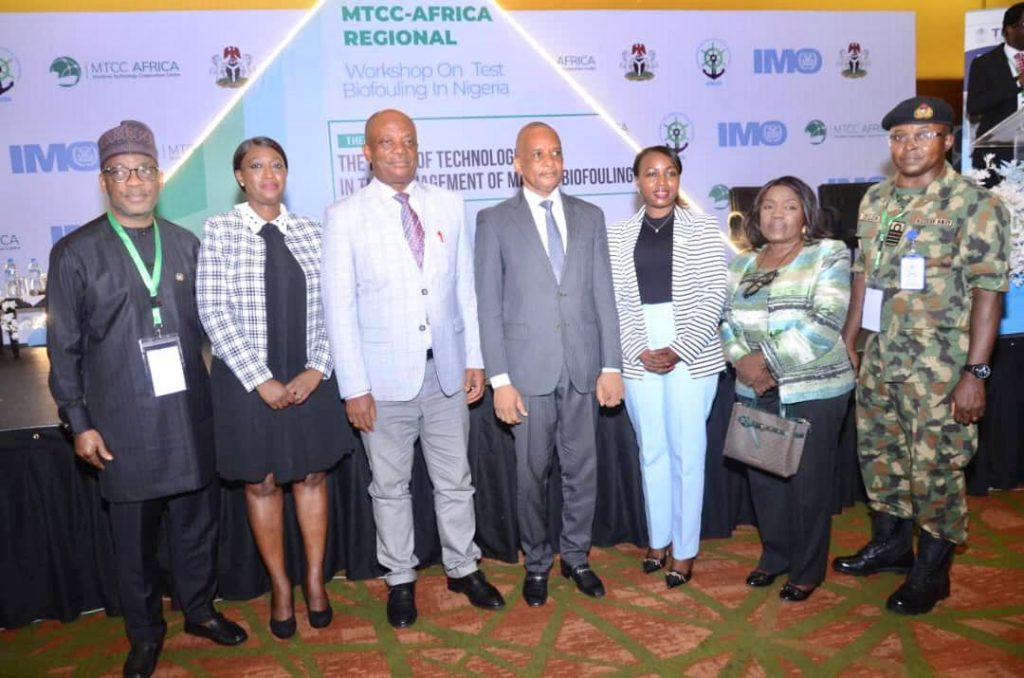NIMASA hosts regional training on biofouling technology transfer

![]()

Photo
L-R: Nigerian Alternate Permanent Representative to the IMO, Mr. Abdul Dirisu; Lecturer, IMO International Maritime Law Institute, Ms. Ramat Jalloh; Secretary General, Abuja MoU, Capt. Sunday Umoren; Director General, Nigerian Maritime Administration and Safety Agency, NIMASA, Dr Bashir Jamoh OFR; Head, Maritime Technology Cooperation Centre for Africa (MTCC Africa), Ms. Lydia Ngugi; Secretary General, African Shipowners Association, Ms Funmi Folorunso and Representative of the Admiral Superintendent Naval Dockyard Ltd., Navy Captain Owens Izilein during the Maritime Technology Cooperation Centre, Africa (MTCC-Africa) Biofouling Management in Lagos.
As part of efforts to explore the newest technologies in Biofouling and in compliance to International Maritime Organization (IMO) rules, the Nigerian Maritime Administration and Safety Agency (NIMASA) is hosting a 3-day Biofouling Management Training for coastal states within the African continent.
Speaking at the opening session on Monday, the Director General of NIMASA, Dr. Bashir Jamoh OFR, posited that the training would showcase the newest technologies, their application including cost-effective practices and related benefits for the environment and efficiency of shipping.
His words: “The importance of protecting and conserving our seas, oceans and their inhabitants cannot be overemphasized as we are intrinsically linked to them and their wellbeing reflects our own wellbeing too.”
“Shipping is at the crux of global trading and the economy with about 90 percent of world trade and commerce is facilitated through shipping. Studies however, revealed that ships serve as over a time have channel for transportation of harmful non-indigenous Invasive Aquatic Species (IAS). These organisms attach themselves to the outer surface and niche areas of a ship, and are then trans located from one ecoregion to another. The process by which these organisms attach themselves to the ship and other surfaces is referred to as Biofouling.”
Noting that Nigeria’s economy relies heavily on international trade, the NIMASA boss emphasized that shipping is a key component of the country’s import and export activities, but it inevitably exposed the nation to threats of the IAS transfer into our territorial waters.
The NIMASA Director General shared a quote, “a healthy ocean is a healthy future” to distill the essence of the workshop on the transfer of environmentally sound technologies (TEST).
While welcoming all participants to the workshop, he encouraged the foreign delegates to explore and enjoy the fascinating sights of the coastal city of Lagos.
Also speaking, the Director, Head, Department of Partnerships and Projects, IMO, Dr. Jose Matheickal said that the IMO is excited that NIMASA has taken the lead in the strategic MTCC Africa training on TEST Biofouling in Nigeria
“We have been encouraging more women to participate in the sector and we are very excited to find African Women in Maritime (WIMAFRICA) Nigeria and other women groups emerging in the maritime space,” he said.



